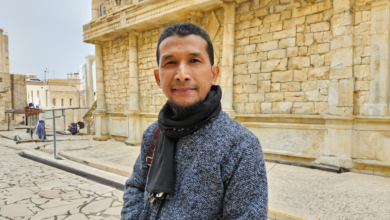Half a Life of Not Praying and Fasting, Here's How to Make Up for It

Assalamu'alaikum Warrohmatullah. Mr. Ustadz, let me ask.
How to pay for fasting when almost half your life does not fast and does not pray?
Mr. Ustadz, I work in Hong Kong and can't pray. But I intend to go home. After returning home, I will fast, pray, and read the Koran.
Unfortunately, there are still needs that I have to fulfill which force me to still have to work in Hong Kong. This means that because of this need, I abandoned all my dreams of going home and wanted to fast and pray.
Am I one of those people who give up?
Thank you, Ustadz.
Wassalamu'alaikum Warrohmatullah.
ANSWER:
Peace be upon you and God's mercy and blessings be upon you
WL…
Prayer and fasting are part of the five pillars of Islam. If one or even both are deliberately abandoned, even though he is a Muslim and believes in his obligations, then he owes a debt to Allah Subhanãhu wa Ta'ala and must be paid immediately, just as a debt to humans must be paid immediately.
Then, if the debt for prayer and fasting has accumulated a lot, even for years, how do you pay it off?
First of all, the person must immediately repent to Allah Subhanãhu wa Ta'ala with nasuha repentance. Allah Subhanãhu wa Ta'ala said:
يَا أَيُّهَا الَّذِينَ آمَنُوا تُوبُوا إِلَى اللَّهِ تَوْبَةً نَص God bless you ْخِلَكُمْ جَنَّاتٍ تَجْرِي مِنْ تَحْتِهَا الأنْهَارُ يَوْمَ لَا يُخ ْزِي اللَّهُ النَّبِيَّ وَالَّذِينَ آمَنُوا مَعَهُ نُورُهُمْ يَسْع َى بَيْنَ أَيْدِيهِمْ وَبِأَيْمَانِهِمْ يَقُولُونَ رَبَّنَا أَتْم ِمْ لَنَا نُورَنَا وَاغْفِرْ لَنَا إِنَّكَ عَلَى كُلِّ شَيْءٍ قَدِي رٌ {٨}
"O you who believe, repent to Allah with the most pure repentance, hopefully your Lord will erase your mistakes and admit you to paradise beneath which rivers flow, on the day when Allah will not humiliate the Prophet and those who believe with him; while their light shone before and to their right while they said, “Our Lord, perfect for us our light and forgive us; verily You are Almighty over all things." [Q.S. At-Tahrim: 8]
Second, the person immediately makes up for his prayers and fasts as much as he missed. Prayer cannot be replaced by paying fidyah. As for fasting, it can be replaced with fidyah, and this also applies to several groups, such as elderly people who are no longer able to fast, sick people, and pregnant or breastfeeding women.
A person who has abandoned prayer for many years must count from when and how many years he has abandoned it. It is even permissible for him to make qadha', even at times where prayer is prohibited, such as after dawn until sunrise, when the sun is directly above his head (a few minutes before midday prayer), and after Asr until sunset.
Remember, prayer debts cannot be inherited if someone dies, unless they leave it behind in circumstances where it is not possible to carry it out, for example being sick and not having time to pray. Likewise with fasting. However, if the person abandons prayer and fasting because he is not in a state of excuse, but deliberately abandons it, then the heirs are not permitted to make qadha' for him.
To make up for fasting, a person can do it through sunnah fasts but with the main intention of making up for obligatory fasting. This is to make things easier, the important thing is that he counts how many days times how many years he breaks his obligatory fast.
This is in accordance with what Sheikh Ibnu Hajar RahimahLlah said through his fatwa as follows:
وَبِهَذَا يُعْلَمُ أَنَّ اْلأَفْضَلَ لِمُرِيْدِ التَّطَوُّعِ بِا لصَّوْمِ أَنْ يَنْوِيَ الْوَاجِبَ إِنْ كَانَ عَلَيْهِ وَإِلاَّ فَال تَّطَوُّعَ لِيَحْصُلَ لَهُ مَا عَلَيْهِ إِنْ كَانَ.
"It can be understood that if a person doubts that he has the obligation to make up for fasting, for example, then he intends to make up for it if he really has the obligation to make up for fasting, and if not then his intention to fast is sunnah, then his intention is also valid, and his fasting qadha is successful by assuming that he is indeed obliged to make up for fasting. Even if it is clear that you have to make up for it. If not (there is a qadha obligation), then he gets the reward for sunnah fasting as in the case of ablution. Thus it is known that people who want to fast sunnahly should intend to make up for the obligatory fast if there is an obligation to make up for it. If not (there is an obligation), then the fast is considered a sunnah fast. This is done in order to produce qadha if there is a qadha obligation." (Ibnu Hajar Al-Haitami, Al-Fatawa Al-Fiqhiyatul Kubra).
As for reading the Al-Qur'an, it is a sunnah and does not require qadha'. It is an additional act of worship that must be maintained consistently. If someone has not read it for a long time, he should ask Allah Subhanahu wa Ta'ala for forgiveness profusely for his negligence and ask to be given sustenance in the form of istiqomah reading the Koran every day & night.
The problem of someone having difficulty or not being able to pray because of work, the key is never to give up and always ask Allah Subhanãhu wa Ta'ala for a way out. If she is a household assistant in a non-Muslim country who meets an employer who cannot give permission to pray, etc., always ask Allah for a way out and never give up hope about the situation, God willing, there will be a way. If there is no way out, then in any case he still owes the prayer and it must be paid when he can pay it as soon as possible.
May Allah always make everything easier for us, amen.
Hope it works!
Peace, mercy and blessings of God
(Answered by Ustadz Very Setiyawan, Lc., S.Pd.I., MH)
#Friends of Migrants want to consult about Islamic religious issues and life issues? Come on, submit the question via WhatsApp message to number +852 52982419.



